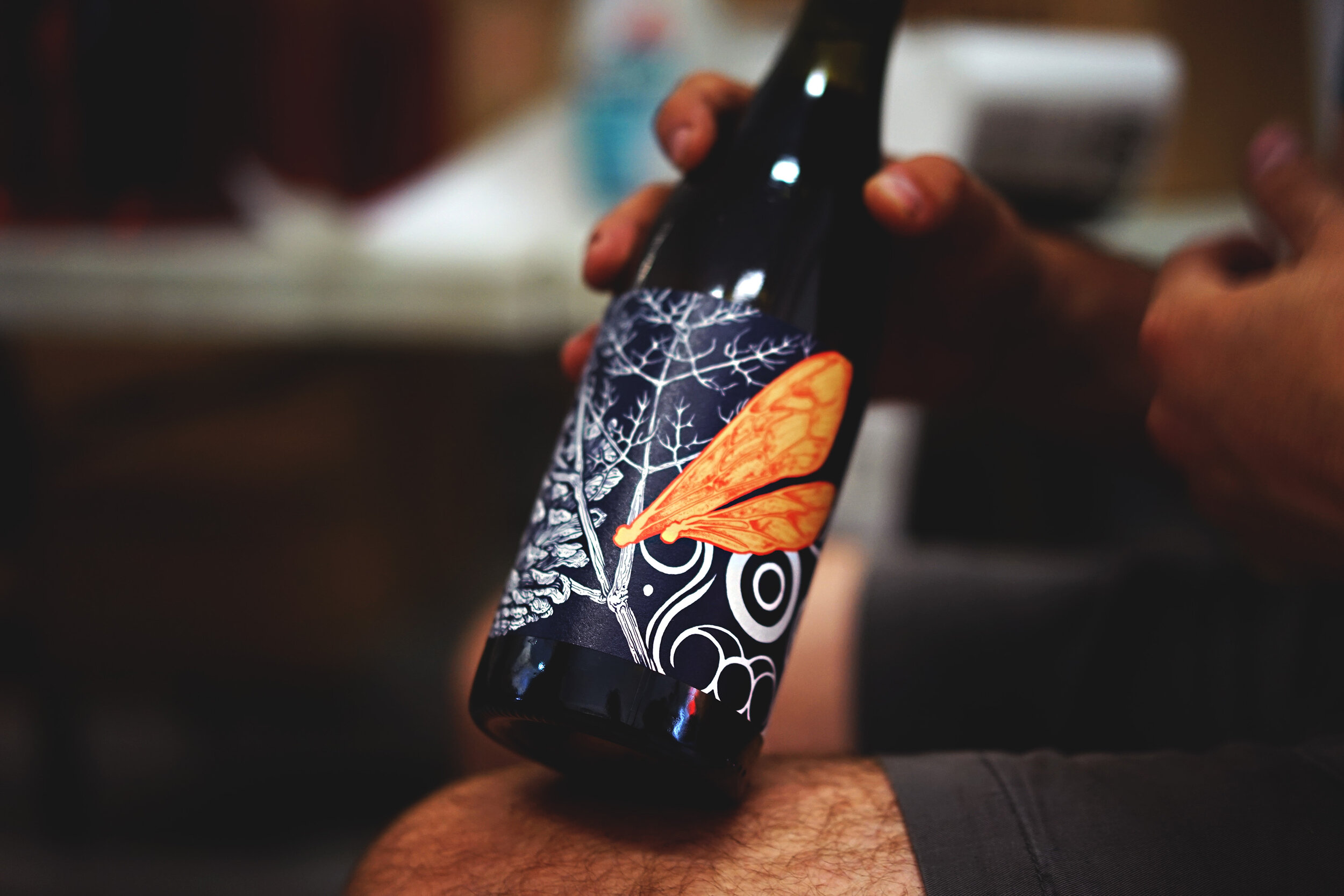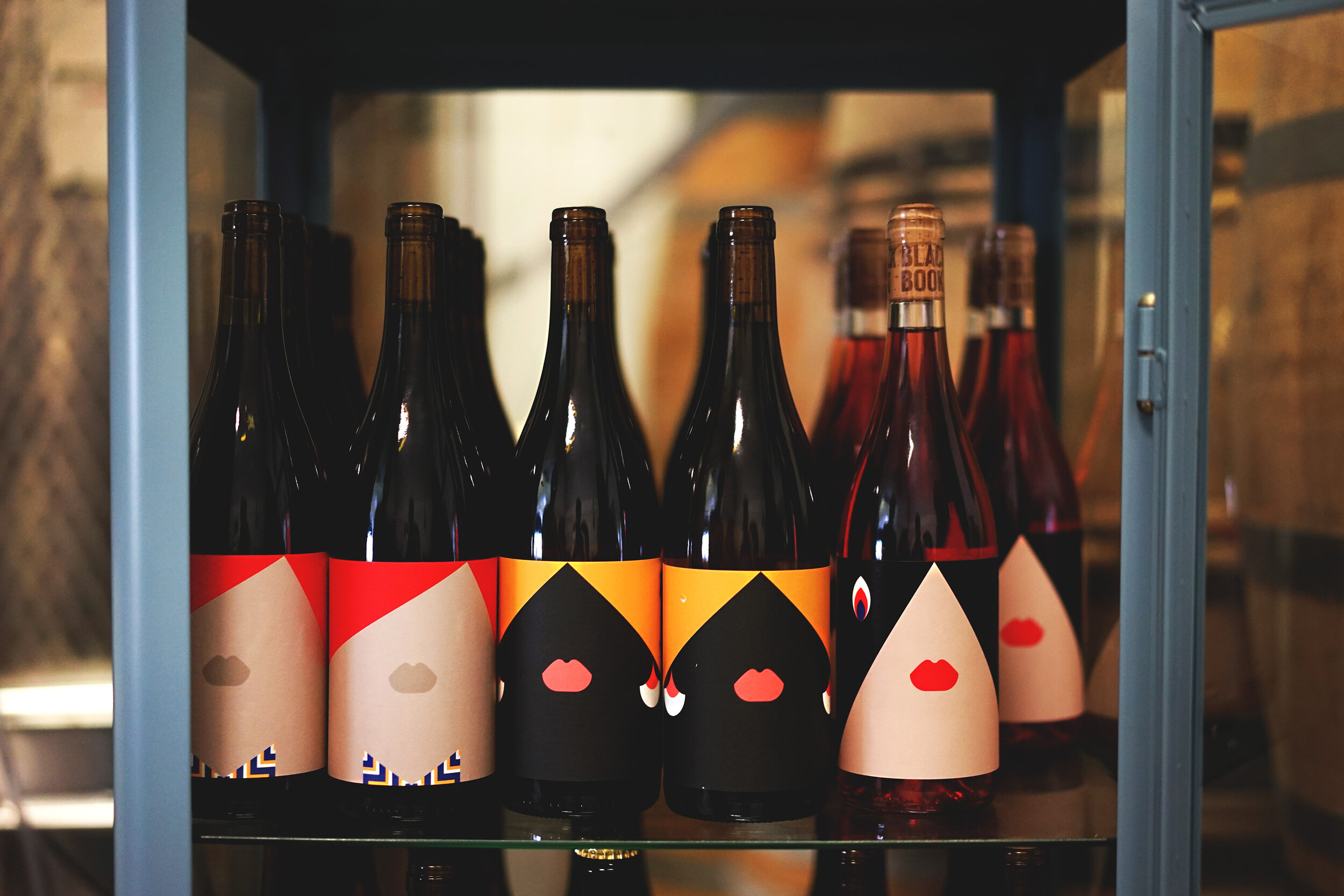Senses and Sensibility — Making Wine Without Ego at Blackbook in Battersea, London
“My wife was like, ‘figure your shit out’.”
Sergio Verrillo is sitting on a foldout chair with a bottle of wine between his knees, precisely lining up and hand-affixing labels that aren’t your average wine label—all graphic shapes and intriguing designs. For Sergio, figuring his shit out meant going to wine school and opening up a winery under the arch in Battersea where we are sat.
I first came across Blackbook Winery earlier this year, on a sticky day in May, as part of a Food Stories supper club at D Vine Cellars in Clapham. The memory of biting into writer and Pit Magazine co-founder Helen Graves’ heavenly, buttery crab gnudi is still fresh in my mind. This is closely followed by the sip I took of the stunning Blackbook 2017 Chardonnay which was produced using grapes that were, from all places, Essex. That night I also sampled their wonderfully textured, complex 2018 Rosé made from Pinot Noir and the 2017 GMF; a funky, fresh, sparkling white wine made using grapes grown around a 50-mile radius of London.
Photography by Matthew Curtis
In Battersea, Sergio continues to label bottles as he talks us through the ethos of having a “precise and more refined” core range of wines (rosé, Chardonnay, Pinot Noir) and a more uncommon selection: “The experimental range is all about asking ‘what can we do?’”
This range includes a still white wine called Tamesis, made using the Bacchus varietal—allegedly the first wine to be both grown and made in London in recent times—and The Mix-Up, which is a blend of Bacchus and Ortega grapes grown in nearby Kent.
Sergio talks about the use of non-Saccharomyces yeasts, different-sized barrels, and skin contact saying, “if it works well on the experimental range then we can apply that know-how to our core range.” This experimental range also includes the GMF—named after the John Grant song of the same name—an undisgorged (i.e. sediment is not removed from the bottle) sparkling wine made in the traditional method.
“We’re not a ‘natural winemaker’ but the GMF is our natural-style wine,” Sergio explains. “We don’t disgorge it, zero dosage [the process of adding sugar after disgorgement to balance acidity, a common practice in traditional method sparkling wine production], it’s zero [added] sulphur. So it’s a cloudy hot mess; it’s natural.”
He describes the natural wine approach as “amazing”, adding “we should try to champion that. The issue is when the philosophy and the ego come ahead of the quality.” When Sergio describes a youth spent as a hippyish, “hacky-sack playing” Phish fan, his unpretentious, laid-back style doesn’t come as too much of a surprise.
Born in New Haven, Connecticut, to a Hungarian mother and Italian father, Sergio grew up around a DIY approach to wine. “My great-uncles, my grandad, my dad, my cousins would get together in September,” he tells me. “They would buy fruit from California and pick up from New Haven port, they’d have a little basket press.” On his father’s side, Sergio’s large extended family moved from Italy only ten years before he was born. “They’re effectively glorified farmers,” he says.
“They grew their own veggies, for personal consumption. They also grew vines in the US, but they didn’t make wine from them,” Sergio explains. Low-intervention, no-nonsense winemaking was already in the blood. “My grandad was very much a believer of natural wines, he never bought commercially-produced wines because he thought they added too many chemicals,” he says adding, “his wine was awful by the way!”
***
Sergio met his Aberdeen-born wife Lynsey in New York, where he was working as an intern and runner for various record labels (their 2018 blend The Mix-Up, is named after a Beastie Boys album). She was there on a long weekend following a stint a year earlier working on the city’s Olympic bid.
Lynsey then moved to London, and Sergio followed. “We were relatively early in our relationship, it was a gamble for him to move. I think he loved London pretty quickly,” Lynsey says. A childhood of summers spent in Europe visiting family had primed him. “He fit right in,” she adds.
Upon arriving in London Sergio came across an advert on Gumtree that sowed the seeds for Blackbook. “I responded to a job advert for Gordon Ramsey Group, an open call for service for Maze [the group's steak and sushi restaurant, now closed] which was opening up.
“I had no idea of the hierarchy of service,” Sergio says. They asked him to be a commis sommelier at the Mayfair restaurant and working alongside experienced industry professionals such as Executive Chef Jason Atherton, he learnt quickly.
His “figure your shit out” moment came later on when searching for a new career path in the industry. “What else is available in the wider world of wine?” he wondered. “I found production and thought, this is amazing!” A course at Plumpton College in East Sussex followed, where he studied Viticulture and Oenology before heading around the globe to learn on the job, including stints in California, South Africa, Burgundy and New Zealand.
A plan for a winery had been hatched but the location was still in play. “We toyed with leaving the UK,” Lynsey recalls. “But California is so crazy expensive. Our quality of life would have been horrific, [and] Europe would have been difficult.”
It was a discovery on the other side of the world that cemented their plan to stay in the UK. “We’d visited a couple of wineries in Australia,” Lynsey tells me. “One [in particular], Innocent Bystander, in Yarra, was such a cool place. We went for lunch one day, in the middle of the town, they had a huge winery and tasting room which was really nice. Such a buzzy dynamic environment,” she says.
““I just want to make really lovely, elegant acid-driven styles.””
This concept of an urban winery and the fortuitous arch rental which cropped up courtesy of Network Rail (at the time—the arches were sold to private investors in September 2018) is what laid the foundations for Blackbook and by April 2017 they were setting up shop.
Sergio and Lynsey work together on Blackbook, their complementary skill sets and backgrounds providing the perfect partnership for running a business. Their inaugural release, the 2017 rosé went on sale the following May, at which point Lynsey was on maternity leave, a lucky prospect as she explains: “We hadn’t anticipated quite how much attention all the supporting elements would need to be, which was probably really naive.”
“Generally, it’s a pretty clean division of labour,” Lynsey explains. “I’ve worked in corporate environments for 15 years, so figuring out how to do a business case, profit and loss, budgets, how to do social media, that’s my area.” The demands of both Blackbook and her job might be full-on, but it sounds like Lynsey has managed to make it work. “I do Blackbook’s social media and email on the tube,” she says. “I get half an hour each way otherwise it’s evenings and weekends.”
***
Sergio’s circuitous journey into production, from another side of the industry, has certainly given him an edge. Ronan Sayburn is Head of Wine at 67 Pall Mall, a members’ club in London which stocks Blackbook wines.
“To see a sommelier turn winemaker, and do it really well is fascinating,” he says. “For someone that’s not classically trained he’s got it spot on.”
When I ask how he found out about Blackbook, he laughs. “I was at a party, Sergio was there, and some other wine people there,” Ronan recounts. “He came up to me and said ‘I make my own rosé, would you like to try it?’ To be honest that’s my worst nightmare!” Luckily for Sergio, their rosé—which is made from Pinot Noir grapes in Clayhill Vineyard in Essex—passed muster.
The more people I speak to, the more it becomes a familiar refrain: to have a London winery is a charming proposition, but it’s Blackbook’s quality that is building their reputation. Greg Andrews from D Vine Cellars in Clapham—where I had that first sip of the 2017 Chardonnay—is effusive.
“The biggest thing is the quality and calibre of the wine. That’s what’s cemented the wine on the shelf,” he tells me. “They’re all well made, I can’t necessarily say that for all English producers.”
Sat among the hulking machines in the winery; large tanks, a 20 hectolitre press and an abundance of barrels, you realise what a leap of faith is necessary to do something like this.
“I made a lot of calls. I got hung up on a lot,” Sergio says. Persistence was key but once he started reaching out he also found a community. “I had some very pleasant conversations, where some people said ‘I can’t help you out but I can put you in touch with someone.’” There’s also a hands-on, problem-solving attitude which comes from his Italian immigrant family.
“My family is full of car mechanics,” Sergio says. “My grandad’s philosophy was, ‘I’m not going to buy it if I can make it and I know what’s in it.’ ”
At one point he tells me his own philosophy is “less is more”, which is not to say there aren’t layers of thought behind each element of the wine. The labels, which he had been carefully sticking when I first arrived at the winery, are emblematic of the Blackbook ethos. The Verrillos enlisted Central Saint Martins graduates, including the Yarza Twins, to create bespoke designs with a whole backstory.
Their experimental range labels take the London Tube and the New York Subway as an aesthetic springboard, but they’re not shouting about it. “It’s there if you want to know about it, it’s a nice added value,” Sergio says.
Looking forward to 2018’s wines, that glorious harvest year and Blackbook’s second vintage, Sergio is confident. “Our Chardonnay is going to be really good, it’s a bit more refined, it’s a bit more precise.” It’s coming out in the next couple of months, but looking further ahead there’s lots more to look forward to.
“What’s exciting is that we’re now going to be able to be site-specific to the point of comparing Pinot Noir and Chardonnay grown 15 miles apart,” he explains. “On different soils, different aspects, different clones. That’s the end goal.” Greg Andrews of D Vine Cellars has his sights set on their red. “Having tasted [it] in barrel, the forthcoming Pinot Noir is going to be a sensation,” he says.
Blackbook’s setup, under a railway arch in a well-heeled suburb of London, may well be the kind of scene that could pass for a subplot in a Richard Curtis film, but their winemaking ethos is less twee and more straightforward. The lack of ego and their burgeoning reputation points to great things, but for now, Sergio’s aims are fairly simple: “I just want to make really lovely, elegant acid-driven styles.”






























